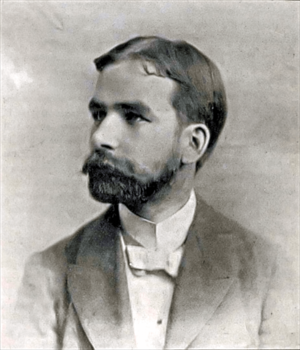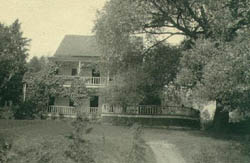Robert Stanley Weir facts for kids
Quick facts for kids
Robert Stanley Weir
|
|
|---|---|

Robert Stanley Weir c. 1899
|
|
| Born | November 15, 1856 Hamilton, Province of Canada
|
| Died | August 20, 1926 (aged 69) Lac Memphrémagog, Quebec, Canada
|
| Nationality | Canadian |
| Occupation | judge and poet |
| Known for | wrote the lyrics of the original English version of the Canadian national anthem "O Canada" |
| Spouse(s) |
Margaret Alexander Douglas
(m. 1882) |
| Children | 6 |
Robert Stanley Weir (November 15, 1856 – August 20, 1926) was a Canadian judge and poet. He is most famous for writing the English words to "O Canada", which is the national anthem of Canada.
Weir was trained as a teacher and a lawyer. He was known as an expert on the laws of Quebec's cities and towns. He became a judge in a city court and later for the Exchequer Court of Canada, which handles legal cases involving the government. He also wrote many poems that were published in magazines and books. His words for "O Canada" became very popular and are still used today.
Contents
Early Life of Robert Stanley Weir
Robert Stanley Weir was born in Hamilton, Canada West. His parents, William Park Weir and Helen Craig Smith, moved to Canada from Scotland in 1852. When Robert was a baby, his family moved to Montreal, Quebec. His father worked there as a customs officer, checking goods coming into the Port of Montreal. Robert's brother, William Alexander Weir, later became a government Minister in Quebec.
Weir studied at McGill Normal School in Montreal. At just 19 years old, he became the principal of Sherbrooke Street School. This was one of Montreal's newest and largest public schools at the time. He continued his studies at McGill University. He earned his first law degree in 1880 and a higher law degree in 1897.
In 1882, he married Margaret Alexander Douglas. Her father was a rich businessman in Montreal. Robert and Margaret had six children: two sons, Douglas and Albert, and four daughters, Beatrice, Winnifred, Marjorie, and Dorothy. Their daughter Marjorie became known for helping to create children's playgrounds in Montreal. Robert himself was involved with the Parks & Playgrounds association. The family spent their time between Montreal and their summer home, Cedarhurst. This home was in Cedarville, a beautiful village on the shore of Lac Memphrémagog in Quebec.
Robert Stanley Weir's Career
From 1881, Weir worked as a lawyer in Montreal. He was very interested in laws about cities and towns. He even published several studies on these topics. In 1892, he tried to become a politician for the Liberal party in Montreal, but he did not win.
In 1898, he was one of several important lawyers chosen to update the laws for the City of Montreal. Many believe he wrote the parts about how the city could buy private land for public use and how it could create local rules.
On May 6, 1899, he was appointed a Recorder for Montreal. A recorder is a type of judge. While being a recorder, he also taught law at the Congregational College of Canada. Later, Weir served as a judge in a city court. He was seen as an expert on the history of city laws. In 1926, he became a judge for the Exchequer Court of Canada. In 1923, he was honored as a Fellow of the Royal Society of Canada, which is a high award for Canadian scholars.
Writing "O Canada"
In 1908, Robert Stanley Weir wrote the English words for "O Canada". He wrote them at his summer home, Cedarhurst. He finished them in time for the 300th anniversary of the founding of Quebec City.
The original French version of "O Canada" was created in 1880. The Lieutenant Governor of Quebec, Théodore Robitaille, asked Sir Adolphe Basile Routhier to write the words. Calixa Lavallée composed the music. It was first performed on St. Jean Baptiste Day that year. The song quickly became popular in Quebec.
English versions of the song started appearing soon after. The first time an English version was used officially in Canada was in 1901. School children sang it for the visit of the Duke and Duchess of Cornwall. They later became King George V and Queen Mary. By 1908, when Weir wrote his version, there were over a hundred English attempts to translate the French song. But Weir's version became the most popular.
The music was already well-known across Canada. With Weir's popular words, "O Canada" quickly became a co-national anthem alongside "God Save the King." However, neither song was officially declared the national anthem by law yet. After Canada became a country in 1867, many English-speaking Canadians wanted "The Maple Leaf Forever" to be their national anthem. But this song did not have a French version, so it could not become Canada's anthem.
Many Canadians today know only part of Weir's original 1908 lyrics. However, more people are learning the full song now. The complete song, including Weir's verses two through four, is being used more often. It is seen as a spiritual expression for Canadians. Weir's ideas for his fellow Canadians are shown in the last verse. It talks about a "Better Day" and a "rich reward" for Canadians who keep their faith.
The original lyrics written by Weir are:
O Canada! Our home and native land,
True patriot love in all thy sons command.
With glowing hearts, we see thee rise,
The True North strong and free.
From far and wide, O Canada,
We stand on guard for thee.
God, keep our land glorious and free!
O Canada, we stand on guard for thee. O Canada, we stand on guard for thee.
O Canada! Where pines and maples grow.
Great prairies spread and lordly rivers flow.
How dear to us thy broad domain,
From East to Western sea.
Thou land of hope for all who toil,
Thou True North, strong and free!
God, keep our land glorious and free!
O Canada, we stand on guard for thee. O Canada, we stand on guard for thee.
O Canada! Beneath thy shining skies
May stalwart sons and gentle maidens rise,
To keep thee steadfast through the years
From East to Western sea,
Our own beloved native land,
Our True North, strong and free!
God, keep our land glorious and free!
O Canada, we stand on guard for thee. O Canada, we stand on guard for thee.
Ruler Supreme, Who hearest humble pray’r,
Hold our dominion within Thy loving care.
Help us to find, O God, in Thee
A lasting, rich reward,
As waiting for the Better Day,
We ever stand on guard.
God, keep our land glorious and free!
O Canada, we stand on guard for thee. O Canada, we stand on guard for thee.
The original French lyrics, written by Sir Adolphe-Basile Routhier in 1880, have lines like "Le Canadien a grandi dans l'espoir. Il est né d'une race fière." This means "The Canadian grew up with hope. He was born of a proud race." Another line is "Parmi les races étrangères, Notre guide est la loi," which means "Among foreign races, Our guide is the law."
Weir made small changes to his lyrics in 1913, 1914, and 1916. The 1916 version was shorter and was used for official events until 1980. In 1980, the Canadian Parliament officially made "O Canada" the national anthem. They also changed some of the English lyrics. The French lyrics have never changed.
On February 7, 2018, a law was passed to change one line. "True patriot love in all thy sons command" became "True patriot love in all of us command." This change made the anthem more inclusive. Canada’s official National Anthem Act does not include Weir’s full song with all four verses.
Death and Legacy
Judge Robert Stanley Weir passed away on August 20, 1926, at Lac Memphrémagog, Quebec, Canada.
Weir's verses for "O Canada" were officially published for the Diamond Jubilee of Confederation in 1927. They slowly became the most accepted anthem in English-speaking Canada. By the 1960s, they had completely won over other versions.
To make "O Canada" the official national anthem, a special group of politicians from the Senate and House of Commons was formed in 1968. This group suggested changes to the English version. For example, they wanted to change one "We stand on guard for thee" to "From far and wide."
The group also thought the government should own the copyright to the words and music. Copyright laws usually last 50 years after the author's death. So, the music's copyright was not a problem. However, Weir's family did not want the words to be changed. Since Weir died in 1926, his words would not be in the public domain until 1976. It was found that a music publisher named Gordon V. Thompson owned the copyright. He agreed to sell it to the government in 1970 for a very small amount of money. Still, the committee hoped to work things out with Weir's family.
Finally, on July 1, 1980, "O Canada" was officially declared the National Anthem of Canada. This was 100 years after Routhier and Lavallée created the French version. Today, "God Save the King" is Canada's royal anthem, played for the King or Queen. "The Maple Leaf Forever" is rarely heard now.
Two Canadian provinces have mottos that come from phrases in the English lyrics of "O Canada." Manitoba's motto is Gloriosus et liber, meaning "glorious and free." Alberta's motto is Fortis et liber, meaning "strong and free." Also, the motto for the 2010 Vancouver Winter Olympics was "with glowing hearts."
A postage stamp was released on June 6, 1980, to honor Weir, Lavallée, and Routhier. On May 24, 1999, a monument for Judge Weir was put up in Weir Memorial Park. This park is on the shores of Lac Memphrémagog, near where he wrote the famous lyrics. A street in Montreal is named Rue Stanley Weir in his honor.
In recent years, some people have criticized the English version of the anthem. They say the line "true patriot love in all thy sons command" is not fair to everyone. People have suggested other words like "in all of us command." Weir's grandson, Steve Simpson, has said that "sons" was not about gender. He believes it referred to a patriotic command from a motherly goddess.
Works by Robert Stanley Weir
- Bills of Exchange Act 1890
- Education Act
- Civil Code
- Code of Civil Procedure
- Municipal Code
Published Works
- — (1889). Review of D.J. Macdonnell's sermon entitled "Death abolished": Preached in St. Andrew's church, Toronto, Sunday, 3rd March, 1889. ISBN 0-66540506-5. https://archive.org/stream/cihm_40506#page/n3/mode/2up.
- — (1890). An insolvency manual containing the articles of the Code of civil procedure relating to abandonment of property, capias ad respondendum, attachments before judgment and revendication: together with notes upon conservatory attachment. Montreal: A. Periard. OCLC 1174856. https://books.google.com/books?id=lXoZAAAAYAAJ&pg=PR1.
- — (1897). The administration of the old régime in Canada (D.C.L.). Montreal: L.E. & A.F. Waters. https://archive.org/stream/administrationof00weiruoft#page/n3/mode/2up.
- — (1903). The Municipal Code of the Province of Quebec. Montreal: C. Theoret. OCLC 24581846. https://archive.org/stream/municipalcodepr00progoog#page/n8/mode/2up.
- —. Gone West.
- — (1908). O Canada. Delmar Music Co.. https://www.loc.gov/item/ihas.100006817/#about-this-item.
- — (1917). After Ypres, and other verse. Toronto: Musson. OCLC 6522680. https://archive.org/details/afterypresotherv0000weir.
- — (1922). Poems: Early And Late. Toronto: Oxford University Press. OCLC 301589267.
 | Lonnie Johnson |
 | Granville Woods |
 | Lewis Howard Latimer |
 | James West |


